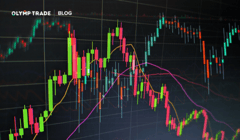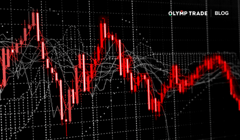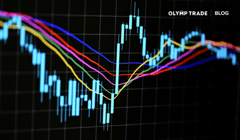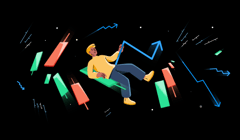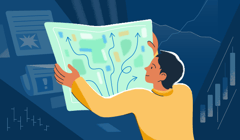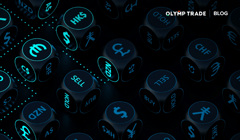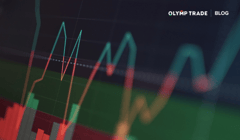
In the early 1970s, foreign exchange was a rarely discussed topic. The few market participants who dealt in Forex were primarily multinational banks and currency dealers. Fast-forward 40 years and the world of foreign exchange has changed dramatically.
The onset of globalization, financial reforms, and a massive increase in cross-border investments turned the international money markets into one of the largest markets in the world. In this article, we will review the history of Forex trading, the current state of play in the foreign exchange (Forex) market, and what the future holds.
Contents:
- The Early Years of Forex: How the Market Started and Developed
- The Modern Forex Market: How It Works Today
- The Future of Forex: How the Market Is Evolving
- Where Can I Trade Forex?
Interact with the underlined words and green dots to get additional details and explanations.
Additional context for the visuals.
Explanations and definitions of terms.
The Early Years of Forex: How the Market Started and Developed
The foreign exchange market (Forex, FX, or currency market) is a global decentralized or over-the-counter (OTC) market for the trading of currencies. This market determines foreign exchange rates for every currency. It includes all aspects of buying, selling, and exchanging currencies at current or determined prices. In terms of trading volume, it is by far the largest market in the world, followed by the credit market.
The History of the Forex Market 📖
The history of Forex could be said to start with the Bretton Woods Agreement, which was signed in 1944. The agreement pegged the US dollar to gold at a rate of $35 per ounce, which gave other currencies their dollar exchange rate.
The Bretton Woods Agreement established a stable exchange rate for the global monetary system. It was intended to provide a predictable depreciation schedule for the U.S. dollar so that all currencies would be adjusted at the same rate. The agreement also fixed the exchange rates for other currencies. It was signed by 44 countries and went into effect in December of 1945.
Although the Bretton Woods Agreement provided a stable exchange rate system, it wasn't without its issues. For example, the rates were fixed versus the prevailing market rates at the time. This meant that the rates sometimes represented an outdated view of market conditions, and there was little flexibility for real-time adjustments. Additionally, the agreement only applied to international transactions. In terms of domestic currencies, governments were free to set their rates. However, this system collapsed in 1971, when the US dollar was no longer pegged to gold leading to the establishment of a free-floating currency market.
This gave rise to the modern foreign exchange market, where currencies are traded directly between countries, and not via the US dollar.
The Modern Forex Market: How It Works Today
The Forex market is the largest and most liquid market in the world. It involves the buying and selling of currencies and is a significant component of the global foreign exchange (Forex) market, which accounts for upwards of 90% of all foreign exchange transactions. Currency trading takes place on either a spot or forward basis and trades 24 hours a day, five days a week, but not on weekends and holidays.
The strength of the Forex market lies in its ability to quickly and efficiently execute trades as it consists of over 800 currency exchanges around the world, including four primary centers in Europe, Asia, North America, and Latin America.
This market is the largest and most liquid, allowing traders to profit from short-term price fluctuations.
Daily, the foreign exchange market handles an estimated $5 trillion in transactions. More than 90% of these trades are in euros with the U.S. dollar and Japanese yen being the next most traded currencies. The strength of the euro and the U.S. dollar compared to other currencies is disguised by the fact that the euro and U.S. dollar are among the most traded currencies in the world.
The Future of Forex: How the Market Is Evolving
In the past decade, Forex trading has become more accessible than ever.
The rise of online trading platforms and mobile apps has made it possible for people to trade Forex from anywhere in the world.
As the Forex market continues to evolve, we can expect to see even more innovation in the way that people trade.
Here are some of the ways that the Forex market is likely to change in the coming years:
More use of artificial intelligence 👨💻
Artificial intelligence (AI) is already being used by some Forex traders to help them make better decisions. AI can be used to analyze large amounts of data to identify trends and patterns that human traders might miss. As AI technology becomes more sophisticated, we can expect to see more Forex traders using AI to help them trade.
Increased use of algorithmic trading 🤖
Algorithmic trading is a type of trading that uses computer programs to automatically place trades. Algorithmic trading is already widely used in other financial markets, such as the stock market. As the Forex market evolves, we can expect to see more Forex traders using algorithmic trading to place their trades.
More use of blockchain technology 🔗
Blockchain is a type of database technology that stores information in blocks that are then linked together in a chain. The Forex market is prone to high volatility, which makes it difficult for traders to make instant decisions. A trading platform that used blockchain technology could help traders by providing them with a secure and transparent way to record and track their trades.
Blockchain technology has already been used to eliminate the use of paper currency in some countries. The use of blockchain technology in the Forex market could help reduce transaction costs, increase trade execution efficiency, and improve settlement times.
Where Can I Trade Forex?
Several platforms enable Forex trading, and Olymp Trade is one of the most popular amongst them. Trading in Forex mode, Olymp Trade’s users get access to a wide range of assets that include not only the currency pairs but stocks, commodities, metals, and other.
Trade ForexRisk warning: The contents of this article do not constitute investment advice, and you bear sole responsibility for your trading activity and/or trading results.


